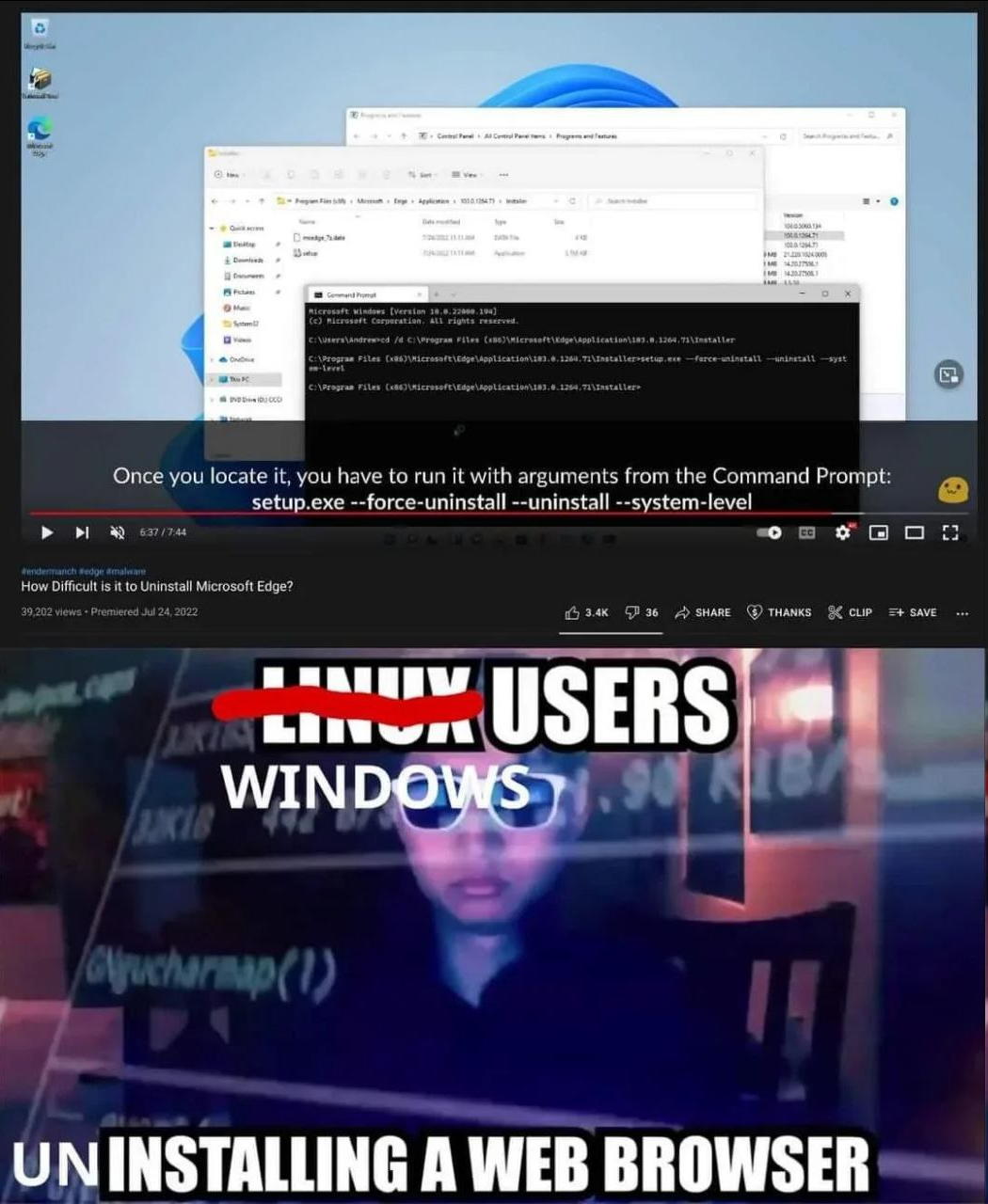this post was submitted on 08 May 2024
796 points (98.1% liked)
linuxmemes
21355 readers
1339 users here now
Hint: :q!
Sister communities:
Community rules (click to expand)
1. Follow the site-wide rules
- Instance-wide TOS: https://legal.lemmy.world/tos/
- Lemmy code of conduct: https://join-lemmy.org/docs/code_of_conduct.html
2. Be civil
- Understand the difference between a joke and an insult.
- Do not harrass or attack members of the community for any reason.
- Leave remarks of "peasantry" to the PCMR community. If you dislike an OS/service/application, attack the thing you dislike, not the individuals who use it. Some people may not have a choice.
- Bigotry will not be tolerated.
- These rules are somewhat loosened when the subject is a public figure. Still, do not attack their person or incite harrassment.
3. Post Linux-related content
- Including Unix and BSD.
- Non-Linux content is acceptable as long as it makes a reference to Linux. For example, the poorly made mockery of
sudoin Windows. - No porn. Even if you watch it on a Linux machine.
4. No recent reposts
- Everybody uses Arch btw, can't quit Vim, and wants to interject for a moment. You can stop now.
Please report posts and comments that break these rules!
Important: never execute code or follow advice that you don't understand or can't verify, especially here. The word of the day is credibility. This is a meme community -- even the most helpful comments might just be shitposts that can damage your system. Be aware, be smart, don't fork-bomb your computer.
founded 1 year ago
MODERATORS
you are viewing a single comment's thread
view the rest of the comments
view the rest of the comments

It is wild that people will say that using
aptto install things is too hard, but then suggest a registry edit to remove Bing from seach. Windows just isn't as casual user friendly as it pretends to.Honestly, with Flatpak and immutable base systems this is a place Linux is really excelling now too. Being able to show a novice user a shared package manager with a search and a bunch of common apps and them actually install/remove them in a safe manner with a high likelihood they'll work out of the box (since they come with all their deps in sync independent from distro) is kinda huge.
It's a pretty mixed bag honestly. Sure there are some apps that we get in a mammoth poorly made appimage we'd probably have to have run in wine before or some terrifying statically compiled program embedded in a run script and that's probably a win.
The trade-off is every developer being their own distro maintainer, 100s of gigs of duplicate dependencies, broken containers with missing libraries, leaky requirements on the underlying system, and everyone needs to be a security expert to understand all the options in flatseal to expose the right features.
Also, instead of one distro source, I've got at least 3 and I've in the last week had to install programs from multiple sources trying to get a functioning version. This feels like the norm rather than an exception.
Also this week had an app image broken by a requirement on a removed system library outside the app and a flatpak missing a key library forcing me to dig up an old .deb version. The later I lost like 6hrs on because clearly libusb was installed on the system but I didn't realize I'd installed the flatpak and in wasn't in the container. Such fun.
So it's not really all sunshine and rainbows yet.
Fwiw, this is not an endorsement of Windows. I strongly believe if most people spent half the time they spent fighting Windows learning Linux they'd never go back.
Don't really need sandboxed software for that. Ubuntu comes with their own software store and even if you only select deb, you just klick on install and you're done
Even good ol' Debian has that, using either GNOME Software or KDE Discover for managing software.
Actually I want to write an app browser for NixOS now.
there's one called
nix-software-center